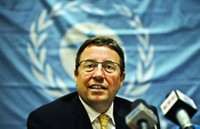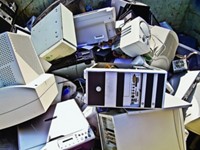Advertisement
Grab your lab coat. Let's get started
Welcome!
Welcome!
Create an account below to get 6 C&EN articles per month, receive newsletters and more - all free.
It seems this is your first time logging in online. Please enter the following information to continue.
As an ACS member you automatically get access to this site. All we need is few more details to create your reading experience.
Not you? Sign in with a different account.
Not you? Sign in with a different account.
ERROR 1
ERROR 1
ERROR 2
ERROR 2
ERROR 2
ERROR 2
ERROR 2
Password and Confirm password must match.
If you have an ACS member number, please enter it here so we can link this account to your membership. (optional)
ERROR 2
ACS values your privacy. By submitting your information, you are gaining access to C&EN and subscribing to our weekly newsletter. We use the information you provide to make your reading experience better, and we will never sell your data to third party members.
Policy
Quitting Quicksilver
Countries agree to start talks to control the metal globally
by Cheryl Hogue
February 23, 2009
Saying that the world needs to reduce mercury pollution, more than 140 countries, including the U.S., agreed on Feb. 20 to begin negotiations on a global treaty to control the metal.
Countries made this decision during a meeting of the governing council of the United Nations Environment Program (UNEP), which was held in Nairobi, Kenya. Governments have discussed the idea of a global mercury accord in recent years, but the plan stalled because the U.S. objected to it. The Bush Administration opposed a binding treaty, instead favoring voluntary measures to control the metal.
As the weeklong UNEP governing council meeting began on Feb. 16, the Obama Administration reversed this U.S. stance by endorsing a global mercury accord. This move paved the way for governments to unanimously call for talks to start on a quicksilver treaty.
"Only a few weeks ago, nations remained divided on how to deal with this major health threat, which touches everyone in every country of the world," says Achim Steiner, UNEP executive director. "Today, we are united on the need for a legally binding instrument and immediate action towards a transition to a low-mercury world."
Mercury is spewed from coal-fired power plants around the world and eventually ends up in rivers, lakes, and oceans, tainting fish that people eat. In recent decades, commercial use of the metal has declined while stocks of commodity mercury, often reclaimed from scrapped equipment, are mounting. This excess mercury is sold cheaply in developing countries where small-scale miners use it to separate gold from rock and sand, poisoning themselves and waterways in the process.





Join the conversation
Contact the reporter
Submit a Letter to the Editor for publication
Engage with us on Twitter